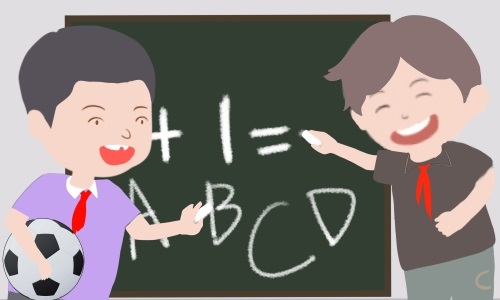八上英语三单元语法知识点
在我们上学期间,相信大家一定都接触过知识点吧!那么,八年级上册英语三单元语法知识点有哪些呢?下面小编为大家带来八上英语三单元语法知识点,希望对您有所帮助!

八上英语三单元语法知识点
1.主语:句子所陈述的对象。
2.谓语:主语发出的动作。一般是有动作意义的动词。
3.宾语:分为动词宾语和介词宾语,属于动作的承受者。
4.系动词:表示状态或状态变化的动词,没有实际的动作意义。如be,感官系动词(look,sound,smell,taste和feel)、保持类系动词(keep,stay和remain)、状态变化类系动词(become、get、turn和go)等。
5.表语:紧跟系动词后面的成分。
6.定语:修饰名词或代词的成分。
7.状语:修饰形容词、副词、动词或句子的成分。
8.补语:分为宾语补足语和主语补足语。是对宾语和主语的补充说明,与其有主动或被动的逻辑关系。例如:You should keep the room clean and tidy.你应该让屋子保持干净整洁。(You是主语,should keep是谓语,the room是宾语,clean and tidy是宾语补足语。)This kind of food tastes delicious.这种食物吃起来很可口。(This kind of food是主语,tastes是系动词,delicious是表语。)注意:主语、谓语、宾语、系动词、表语、补语是一个句子的主干成分;定语和状语是一个句子的修饰性成分,不是主干成分。
9.简单句的基本形式是由一个主语加一个谓语构成。
10.复合句由一个主句和一个或一个以上的从句构成。
11.两个或两个以上的简单句用并列连词连在一起构成的句子,叫做并列句,其基本结构是“简单句+并列连词+简单句”。
八年级上册英语Unit3的知识点归纳
一、词组、短语:
1.Turn n the blender.启动搅拌器, Hw d u ae a banana il shae?你怎样做香蕉奶昔?
Tw nths is quite a lng tie. Twent dllars is enugh.
2. 动词不定式,动名词,从句或不可数名词作主语时,谓语动词用单数。
T see is t believe. It is nt eas t aster a freign language.
3. 由and连接两个成分作主语时,要根据其表示的意义来决定谓语动词的形式。如果其表示的是一个整体的概念或指的是同一事物,谓语动词用单数,如果其表示的是两个不同的对象时,谓语动词用复数。
The writer and the teacher are cing.
The pet and teacher is ne f friends.
4. 集合名词peple,plice一般看作复数意义,其谓语动词用复数。另外一些集合名词fail,class等作主语时,谓语动词是用单数还是复数,要根据这些词在句中的实际含义而定。当他们表示的是整体意义时,谓语用单数;当他们强调个体成员时,谓语动词用复数形式。
In England, peple eat fish and chips.
The Chinese peple(民族)is a great peple,but the Chinese peple are brave and hard-wring peple.中华民族是个伟大的`民族,而中国人民是勤劳勇敢的。
5. 名词性物主代词ine,urs,his,hers, its,urs,theirs等作主语时,谓语动词的数取决于该代词所表示的意义是单数还是复数。
His parents are ung, but ine are ld.
6. 以s结尾的名词本身不表示复数意义时,谓语动词通常用单数形式,如news,phsics,plitics等。
N news is gd news. Phsics is the st difficult subect fr hi.
7. 由r,either…r…,neither…nr…,nt nl…but als…等词连接名词或代词作主语时,谓语动词的数和最接近的主语一致。
Neither u nr Li Hua has been t Shanghai befre.
8. 以there,here开头的句子,若主语不止一个,其谓语动词的形式和邻近的那个主语一致。
There is a table and fur chairs in the r.
Here are se bs and paper fr u.
9. trusers,clthes,glasses,cpasses,chpstics等作主语时,谓语动词用复数。但如果前面有a pair f短语时,谓语动词用单数。
i’s trusers are brwn. The pair f glasses is Mr. Green’s.
10. 由“a lt f/lts f/plent f+名词”或“分数+名词”作主语时,谓语动词的单复数根据名词的单复数而定。
A lt f peple have been t Lndn.
Three-fifths f the water is dirt.
11. “a nuber f +复数名词”作主语时,谓语动词用复数;“the nuber f+复数名词”作主语时,谓语动词用单数。
A great nuber f birds fl t the suth in winter.
The nuber f lins des nt change uch if peple leave things as the are.
12.代词sething,anthing,nthing,everne,anbd,nbd,each,neither,either,little,uch,ne等作主语时,谓语动词用单数形式。
Neither f us is a b。
Each f the has an English dictinar。
One f the students was late fr schl。
13.All,se nne,st,an等代词作主语时,若其指复数概念,谓语动词用复数形式;若其指单数形式,则谓语动词用单数形式。
Nt all wr is difficult。
Nt all the students are here。
14.有些形容词前面加上定冠词the,如the pr,the ld,the ng,the rich,the ding等用来表示一类人时,主语为复数意义,谓语动词用复数。
The ld are gd taen care f。
15.T’s and Bb’s rs are the sae.
A and B’s 表示两人共有一样东西,后常跟单数名词,谓语常用单三。
T and Bb’s r isn’t the sae.
二、词语辨析
1、turn n 打开,接通(电源,气,水),反义词是turn ff. turn up/turn dwn 调高/低音量。
1. pur…int… 将…倒入/灌入… int 是:进入… in 是:在…内。
在put, thrw, brea, la, fall 等动词之后,既可用in,也可用int。但in可作副词,int不能。
He put all the bs in/int the bag. Ce in!请进!
3. 有关ae 的短语: ae the bed 铺床 , ae tea沏茶 ,ae truble 惹麻烦,ae ne 赚钱 , ae a decisin 做决定,ae a telephne call 打电话,ae a visit 拜访 , ae a istae 犯错误 , ae a nise 弄出噪音,ae a living 谋生 , ae sure 务必
4. ne re thing = anther ne thing 基数词 + re + 名词 = anther + 基数词 + 名词
5. fill with 用…填充… be filled with = be full f 充满….
The b filled the bttle with sand. / The bag was full f clthes.
6. cver…with… 用…把…覆盖 be cvered with 被…所覆盖。 cver n. 封面,盖子。
Ann cvered her face with her hands. / The cver f the agazine is nice.
7. It’s tie (fr sb) t d sth. 到某人做某事的时候了。
It’s tie fr sth. 到做某事的时候了。
八年级英语第三单元知识点
一、不用疑问词,但需要用yes或no回答的疑问句,叫一般疑问句。句末用问号“?”。
一般疑问句的基本用法及结构一般疑问句用于对某一情况提出疑问,通常可用yes和no来回答,读时用升调。其基本结构是“be / have /助动词+主语+谓语(表语)”:
Is he interested in going?他有兴趣去吗?
Have you ever been to Japan?你到过日本吗?
Does she often have colds?她常常感冒吗?
Did you ask her which to buy?你问没问她该买哪一个?
二、陈述句变一般疑问句的方法
1.动词be的疑问式:动词be根据不同的时态和人称可以有am,is,are,was,were等不同形式,可用作连系动词(表示“是”、“在”等)和助动词(用于构成进行时态和被动语态等),但不管何种情况,构成疑问式时,一律将动词be的适当形式置于句首:句型:Be动词+主语~?
Is your father angry?你父亲生气了吗?
Yes,he is.是的,他生气了。
No,he isn't.不,他没生气。
Were the babies crying last night?(进行时)
昨天晚上这些孩子们一直在哭吗?
Yes,they were.是的,他们在哭。
No,they weren't.不,他们没哭。
Is English spoken all over the world?(被动语态)
全世界都说英语吗?
Yes,it is.是的。
No,it isn't.不。
2.动词have的疑问式:动词have根据不同的时态和人称可以有have,has,had等形式,可以用作实意动词和助动词,分以下情况讨论:
①用作实意动词表示状态,如表示拥有、患病或用于have to表示“必须”等,在构成构成式时可以直接将have,has,had置于句首,也可根据情况在句首使用do,does,did:
Does he have [Has he] anything to say?他有什么话要说吗?
Do you have [Have you] to leave so soon?你必须这么早走吗?
Did you have [Had you] any friends then?他当时有朋友吗?
②用作实意动词表示动作,如表示“吃(=eat)”、“喝(=drink)”、“拿(=take)”、“收到(=receive)”、“度过(=spend)”等,构成疑问式时不能将have提前至句首,而应在句首使用do,does,did:
Does he have breakfast at home?他在家吃早餐吗?
Did you have a good time at the party?你在晚会上玩得高兴吗?
③完成时的一般疑问句
句型:Have(Has)+主语+动词的过去分词+~?
Have you known her since your childhood?
你从童年就认识她吗?
Yes,I have.是的。
No,I haven't.不。
过去完成时的一般疑问句
句型:Had +主语+动词的过去分词+~?
Had he learned about two thousand English
words before he came here?
他来这里以前就已经学了大约两千个单词了吗?
Yes,he had.是的。
No,he hadn't.不。
3.情态动词的疑问式:情态动词的疑问式通常是将情态动词置于句首:
句型:情态动词+主语+动词原形~?
Can you bring me some apples?
你能给我拿来些苹果吗?
Yes,I can.是的,可以。
No,I can't.不,不可以。
Can you speak English?你会说英语吗?
Must I finish the work at once?我必须马上完成工作吗?
4.实意动词的疑问式:一般实意动词的疑问式,通常应根据不同时态和人称在句首加助动词do,does,did等:
句型:Do(Does,Did)+主语+动词原形~?
Do you go to school every day?你每天都上学吗?
Does the boy like dancing?这男孩喜欢唱歌吗?
Did you see the film last night?你昨晚看了这部电影吗?
Did he do morning exercises yesterday?
昨天他做早操了吗?
Yes,he did.是的,他做了。
No,he didn't.不,他没做。
中考英语语法中形容词级别问题:
a. Our classroom is twice larger than theirs。(我们的教室是他们的两倍。)这种表示倍数的句子用 …times +形容词比较级+than …
b. I'm three years older than you.(我比你大三岁。)表示"大三岁,""高二厘米"等时用"表示数量词的词+比较级"。
c."越来越……"用"比较级+and +比较级"来表示。如:The earth is getting warmer and warmer。(地球变得越来越暖和。)
d."越……就越……"用"the +比较级…,the+比较级…"来表示。如: The busier he is,the happier he feels。(他越忙,越觉得高兴。)
中考英语语法最高级用法:
最高级要用于三者以上。还有几点是不得不提的:
alone 和lonely:I feel lonely, because I am alone at home. 你独自一人在家用
"alone" 表示"单独的"、"独自一人的",它表示一个客观事实,在句中只能做表语。你在家感到寂寞,
"lonely",表示主观上感到 "孤独""寂寞",指一种悲伤忧郁的情绪,可作定语和表语。
older和elder: Jack is older than me, he is my elder brother.杰克比我大要用"older",表示"年纪大的,年老的",常用做表语;他是我的长兄用"elder",表示"年老的,年长的",用做定语,只用于比较两个人的长幼,只能作表语。
